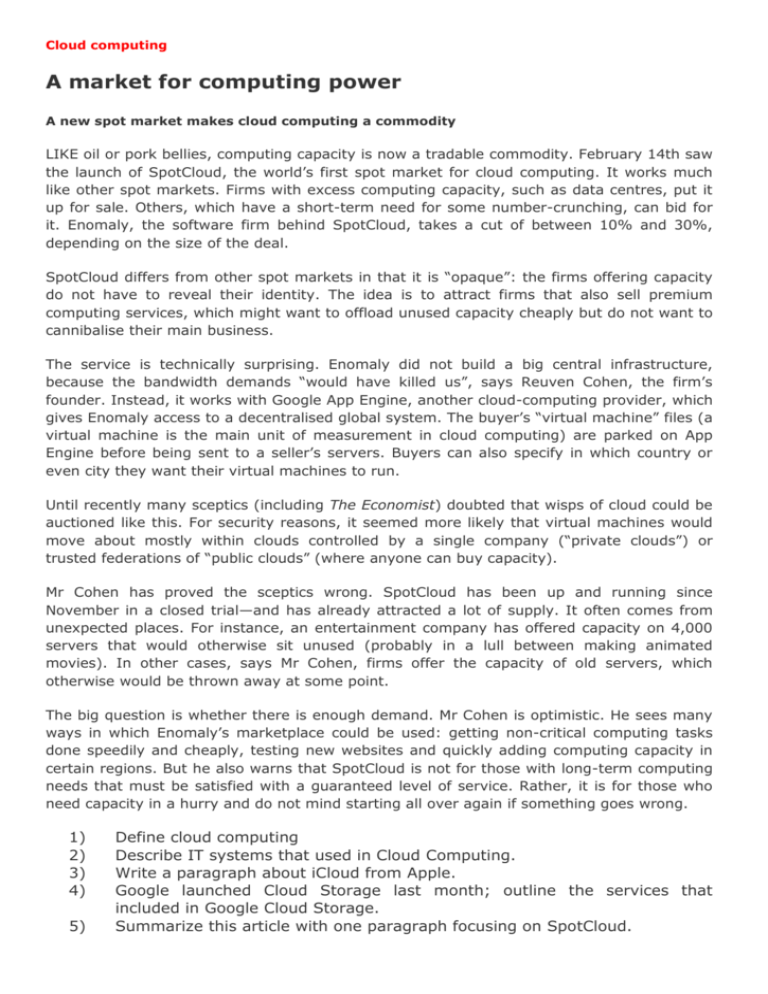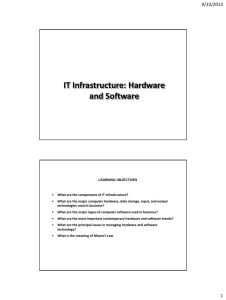Cloud computing
advertisement

Cloud computing A market for computing power A new spot market makes cloud computing a commodity LIKE oil or pork bellies, computing capacity is now a tradable commodity. February 14th saw the launch of SpotCloud, the world’s first spot market for cloud computing. It works much like other spot markets. Firms with excess computing capacity, such as data centres, put it up for sale. Others, which have a short-term need for some number-crunching, can bid for it. Enomaly, the software firm behind SpotCloud, takes a cut of between 10% and 30%, depending on the size of the deal. SpotCloud differs from other spot markets in that it is “opaque”: the firms offering capacity do not have to reveal their identity. The idea is to attract firms that also sell premium computing services, which might want to offload unused capacity cheaply but do not want to cannibalise their main business. The service is technically surprising. Enomaly did not build a big central infrastructure, because the bandwidth demands “would have killed us”, says Reuven Cohen, the firm’s founder. Instead, it works with Google App Engine, another cloud-computing provider, which gives Enomaly access to a decentralised global system. The buyer’s “virtual machine” files (a virtual machine is the main unit of measurement in cloud computing) are parked on App Engine before being sent to a seller’s servers. Buyers can also specify in which country or even city they want their virtual machines to run. Until recently many sceptics (including The Economist) doubted that wisps of cloud could be auctioned like this. For security reasons, it seemed more likely that virtual machines would move about mostly within clouds controlled by a single company (“private clouds”) or trusted federations of “public clouds” (where anyone can buy capacity). Mr Cohen has proved the sceptics wrong. SpotCloud has been up and running since November in a closed trial—and has already attracted a lot of supply. It often comes from unexpected places. For instance, an entertainment company has offered capacity on 4,000 servers that would otherwise sit unused (probably in a lull between making animated movies). In other cases, says Mr Cohen, firms offer the capacity of old servers, which otherwise would be thrown away at some point. The big question is whether there is enough demand. Mr Cohen is optimistic. He sees many ways in which Enomaly’s marketplace could be used: getting non-critical computing tasks done speedily and cheaply, testing new websites and quickly adding computing capacity in certain regions. But he also warns that SpotCloud is not for those with long-term computing needs that must be satisfied with a guaranteed level of service. Rather, it is for those who need capacity in a hurry and do not mind starting all over again if something goes wrong. 1) 2) 3) 4) 5) Define cloud computing Describe IT systems that used in Cloud Computing. Write a paragraph about iCloud from Apple. Google launched Cloud Storage last month; outline the services that included in Google Cloud Storage. Summarize this article with one paragraph focusing on SpotCloud.











